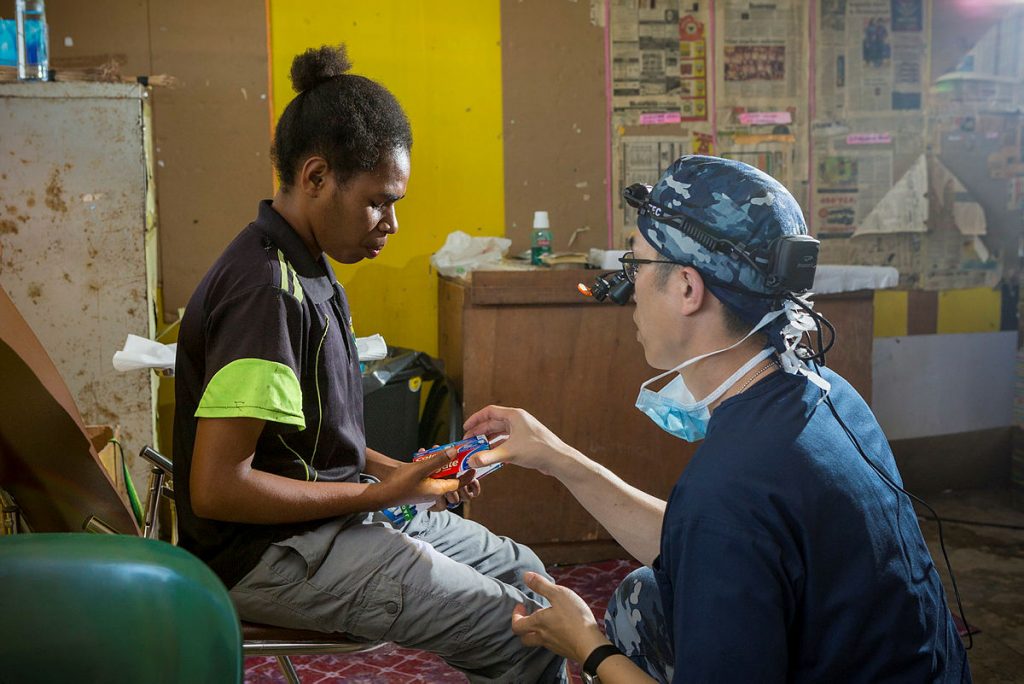
The Australian Defence Force has long had an important role in providing humanitarian assistance to Pacific island countries. The force has extraordinary capabilities—people, expertise, training and equipment—in delivering assistance quickly and efficiently. The ADF is one of our most important agencies in helping our Pacific islands partners develop capabilities to address a range of security challenges.
My new report for ASPI,
Next step in the step-up, released today, looks at ways in which the ADF can build health security in the Pacific as part of a new phase in Australia’s Pacific step-up.
The community health needs of Pacific island countries will grow significantly in coming years as they endure ever more natural disasters. Climate change is likely to cause
ongoing stresses to island health systems through extreme weather events, increased diseases, reduced water quality, heatwaves and population displacement. Calls for assistance from Australian civil and military organisations will almost certainly grow ever louder.
Many countries rely on the unique capabilities and expertise of militaries to provide humanitarian assistance. With assets such as ships, planes and trucks and expert personnel, military organisations are often best placed to deliver food, logistic support, engineering assistance and emergency medical services, especially in times of crisis.
The provision of medical assistance to communities in need is seen as a particularly important way of ‘winning hearts and minds’. So-called medical diplomacy can involve short-term relief, such as responding to disasters, or long-term measures to build capabilities.
The US military is often at the forefront of assistance efforts as an integral part of US
humanitarian assistance and disaster relief missions.
The
United States, and now
China, are also increasingly using naval hospital ships to deliver military health assistance. These gleaming white ships certainly capture the imagination. Indeed, who wouldn’t be impressed with the idea of a floating hospital, fully staffed and with access to all the latest technology, anchored off a tropical island, delivering the medical services to (hopefully, grateful) locals?
But using militaries to deliver health services is also subject to a lot of
criticism. ‘Drive-by medicine’ by military health professionals on brief visits can do more harm than good, including by undercutting and discrediting local health providers and providing treatments that can’t be sustained. Importantly, they rarely build local capabilities or relationships.
For these reasons, the ADF is rightly cautious about providing health assistance. ADF personnel regularly provide logistics and engineering assistance following natural disasters, including in humanitarian assistance and disaster relief operations in countries such as Fiji, Papua New Guinea, Niue, Samoa, Solomon Islands, the Philippines and Vanuatu. But since 2007 the ADF hasn’t provided health assistance as part of those operations.
This has led to the underutilisation of Australia’s military health capabilities in the Pacific. Important opportunities to reinforce regional partnerships aren’t being pursued.
The ADF is well placed to support the rollout of Covid-19 immunisation programs through transport and logistical support to Pacific island countries, as part of delivering on the vaccination initiative announced at the
recent Quad leaders’ meeting. We’ve seen that in recent weeks in PNG.
But the ADF can also play an important long-term role in building health capabilities, while also avoiding the problems traditionally associated with military health assistance. The government should consider a new role for the ADF in the Pacific through developing mutually beneficial enduring
military health partnerships.
This would involve the rotation of ADF health professionals through partner hospitals where they would have the opportunity to gain unique frontline experience from local experts, while also sharing their own knowledge and skills with local clinicians. The aim would be to build experience and training for both sides as part of an enduring institutional relationship.
Each one-month rotation would comprise ADF clinicians of different specialties, so, although the ADF presence would endure, no clinical specialty would always be present. ADF clinicians wouldn’t bring equipment or consumables to avoid interfering in the hospitals’ own supply chains.
For the ADF, the costs of rotating deployments of relatively small numbers of permanent and reserve personnel could be managed as part of overall training costs.
This would not be traditional humanitarian assistance, but would be a true partnership, filling a major gap in the ADF’s training needs while also delivering lasting benefits to our Pacific neighbours.
It would also be a big benefit to Australia. Our effective withdrawal of ADF health assets from humanitarian assistance and disaster relief operations since 2007 has left the force’s clinical staff with few overseas operational roles. The competencies required for field-deployed health care, for example, in treating tropical diseases and in lifesaving ‘damage control’ surgery, can’t easily be acquired in the Australian civilian system. That leaves an experience gap.
As a result, many ADF clinicians lack experience and mentorship from working in small, remote hospitals in the context of a high prevalence of trauma and infectious disease. Yet those are exactly what ADF field hospitals must deal with in a military contingency. In contrast, many medical colleagues in the Pacific islands are experts in those areas. This means that ADF clinicians may miss important training opportunities necessary to properly fulfil their military roles.
It’s also a question of recruitment and retention. Many health professionals join the ADF, as either permanent or reserve personnel, with a view to helping those in need in our region. Current policies effectively deny them the opportunity to serve in the region as ADF members.
There are important opportunities here. An enhanced role for the ADF in regional health security, properly structured, might ultimately come to be seen alongside the Pacific patrol boat program as a successful example of mutually beneficial partnerships between the ADF and our Pacific neighbours.
 Print This Post
Print This Post